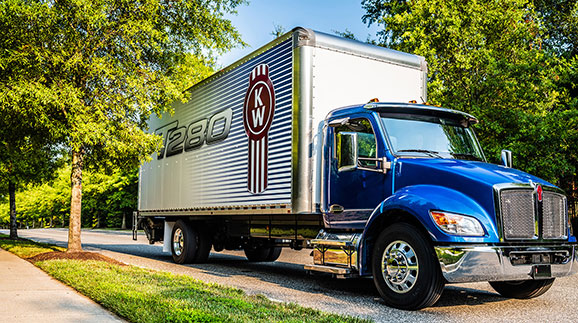Volume 27 | Issue 1
Click here to read the complete illustrated article or continue below to read the text article.
In 1924, Harry Kent and Edgar K. Worthington started a business to build customized trucks capable of carrying heavy loads over difficult muddy logging roads in the Pacific Northwest. The new business headquartered in Seattle, Wash. combined their names to form the trucking company Kenworth.
The partners manufactured 80 trucks in the first year of operation. By 1925 production upped to nearly two customized trucks per week.
Fast forward to its centennial celebration in 2024, Kenworth is launching two Special Edition trucks, the T680 Signature, available in mid- and high-roof configurations, and the Wool 900L Limited, available in extended day cab, flat-top or studio sleeper options.
Both Special Edition models feature signature seats, serialized badging, unique trims, and paint options, as well as Kenworth advanced technologies and manufacturing processes that deliver higher fuel efficiency and lower cost of ownership. The Wool 900L, one of the longest of long-nosed conventionals at 130 inches from bumper to back-of-cab, as the name implies is limited to 900 production models.
All Kenworth trucks offer a suite of driver-optimized technologies:
The first truck manufacturer to receive the EPA’s Clean Air Excellence Award, Kenworth is also at the forefront of truck electrification. Built on proven platforms, with superior visibility, reliability, maneuverability and driver comfort, the T680E Class 8 and K270E/K370E Medium Duty models combine state-of-the-art zero emission powertrains with comprehensive charging solutions and infrastructure support.
To further push the envelope for zero emissions trucking, Kenworth has embarked on a pilot hydrogen fuel cell class 8 tractor. Kenworth integrated Toyota’s latest advancements in hydrogen fuel cell technology into its flagship T680 on-highway truck. The T680 FCEV has a range of up to 450 miles at a top speed of 70 miles per hour, an ideal solution for weight-sensitive operators with short-distance deliveries.
Kenworth also aims to make traditional truck’s more energy efficient and sustainable, while also improving performance. One example is the recent introduction of new PACCAR TX-12 PRO automated transmission, available on select models, which promises higher performance and efficiency.

Kenworth also delivered the industry’s first 15-liter compressed natural gas (CNC) powered truck to UPS. The Cummins X15N meets both upcoming 2027 EPA emission requirements and CARB 2024 Low NOx standards; Kenworth is the first major truck manufacturer to offer an engine that meets CARB’s NOx emission standards. At the same time, the CNC truck offers diesel-like power and performance, making it appealing for regional and long-haul operations.
Just as Kenworth commemorates its 100th anniversary as a company, Kenworth’s Chillicothe, Ohio manufacturing plant celebrates 50 years since a Kenworth truck rolled off its assembly line.
The Kenworth Chillicothe plant is located on a 120-acre site, some 50 miles south of Columbus, Ohio. Beginning in 2018, Kenworth invested $300 million in the 622,000-squarefoot facility that features a number of advanced manuacturing technologies, including robotic assembly and a state-of-the-art paint facility. The plant received an Encouraging Environmental Excellence “E3” Gold Award from the Ohio Environmental Protection Agency (EPA) for going beyond regulatory compliance requirements for environmental stewardship activities.
As a leader in the development of advanced diesel powertrains, zero emissions vehicles, connected truck technologies and advanced driver assistance systems, Kenworth is creating transportation solutions to drive a better world.
Scott Ellyson, CEO of East West Manufacturing, brings decades of global manufacturing and supply chain leadership to the conversation. In this episode, he shares practical insights on scaling operations, navigating complexity, and building resilient manufacturing networks in an increasingly connected world.